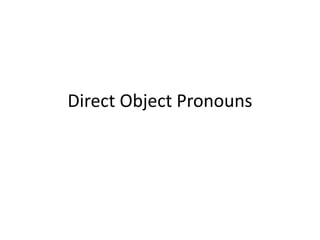Melden
Teilen

Weitere ähnliche Inhalte
Was ist angesagt?
Was ist angesagt? (12)
Using Direct & Indirect Object Pronouns in Spanish

Using Direct & Indirect Object Pronouns in Spanish
Mehr von ck65
Mehr von ck65 (20)
6-Direct object pronouns
- 2. Direct Object pronouns Me Me nos us Te You (fam. sing.) Lo him, it (m.), los you (form. you (form. Pl.), them (m., sing.) m. + f.) La her, it (f.), you las you (form. (form. sing.) Pl.), them (f.)
- 3. Replaces a direct object noun • Yo pateo la pelota. – Yo la pateo. • Ellos mandan a Carlos al campamento. – Ellos lo mandan al campamento. – Ellos no lo mandan al campamento este verano.
- 4. With –ing, Infinitives and Affirmative Commands • Nosotros te queremos amar. • Nosotros queremos amarte. • Ellas las están comiendo. • Ellas están comiéndolas. • Mándenlo, por favor. But • No lo manden, por favor.